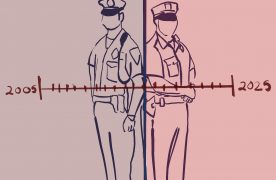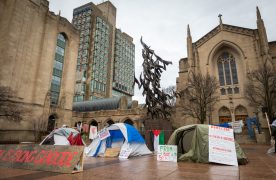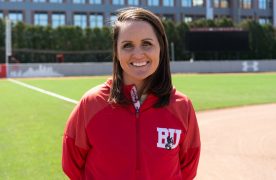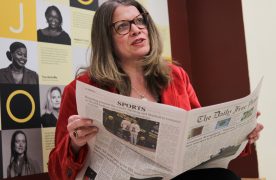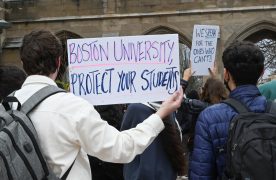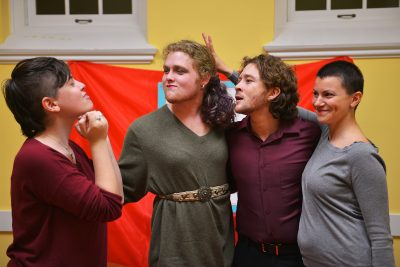
In a world where violent acts often dominate the news, it can be important to find acceptance and support from others. But for many marginalized groups targeted by these attacks, community can be hard to come by — therefore, they must form their own.
People of all different ages squeezed into the pews of the Sanctuary United Church of Christ in Medford on Friday, ready to see the Butterfly Music Transgender Chorus, made up of transgender and gender-nonconforming members of the Boston community. The chorus partnered with Arts Across Medford, a month-long festival celebrating diverse forms of art, and Sanctuary UCC, which emphasizes music in its ministry, to pull off this concert.
George Hastie, a member of the chorus since its founding, said they all felt something special about being with each other and singing together.
“We’re doing something together creatively,” Hastie said. “It builds community and it’s fun.”
But the members of the Butterfly Music Transgender Chorus weren’t just there to sing — they were there to spread visibility and create a community.
Sandi Hammond, founder and artistic director of the Butterfly Music Transgender Chorus, said she formed the chorus as a way for transgender individuals “to explore their voice without any sort of gendered expectations from the director.”
It’s a space where individuals can come together in a creative, positive way — something rare in the LGBT community, where funerals and political rallies tend to unite members, Hammond explained.
But these two sides of the transgender community are tied together.
That’s why Hammond and Derek Zinky, pianist for Butterfly Music Transgender Chorus, collaborated to write “The Pulse Suite,” a three-part song inspired by the June 2016 shooting at a gay nightclub in Orlando. The words for the piece came directly from the writing of chorus members and Puerto Rican transgender individuals in the days after the shooting.
A number of speakers helped to put the piece into context before its debut. Eunice Avilés, a doctor of clinical psychology and a gender specialist, spoke about her work with trans individuals in Puerto Rico. Transgender rights have a long way to go in the country, she said, but her photography project, “Transciende,” works to change some of this stigma.
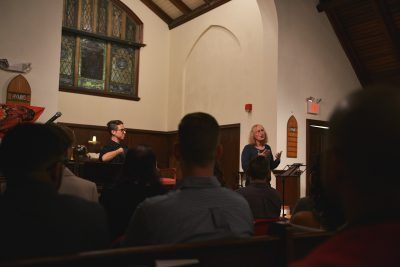
Most of the 49 people killed in the shooting were Latino, and many were younger than 40 years old. It was the largest act of violence against LGBT individuals in U.S. history, Hastie said.
But “The Pulse Suite” aimed to do more than spread awareness. Its purpose also emphasized helping individuals move forward. It’s about “mourning the victims, but also recognizing what happened and keeping their memory alive,” Hastie said.
“The Pulse Suite” mixed overlapping voices, minor keys, flute, piano and other elements to create a somber mood. Singers cried out sentiments such as “it could have been me,” words directly from the chorus members’ writings. But it ended with a positive spin, with singers bringing to life a Spanish phrase written by a community member. It translated to “we must follow our own path, trusting and hoping that the light will shine in this world.”
It felt wonderful to see the energy from the audience members, Hastie said.
Susan Ringler, 62, of Cambridge, said she thought “The Pulse Suite” was particularly moving and she hoped other choruses would cover the same issues in the future.
“Singing is completely human,” Ringler said, on her support towards the trans chorus.
Amanda Shu, 19, of Melrose, also said she came to the concert to support the LGBT community.
Listening to the songs made her “a little bit more hopeful in the world,” Shu said.
When asked what she wanted viewers to take away from their experience at the concert, Hammond said she had high hopes.
“I hope that people will be inspired to continue to fight homophobia and transphobia, and also to perhaps make a contribution to an LGBT organization,” she said, mentioning groups like Fenway Health and the Orlando Gay Chorus.
Though the concert attracted hundreds of community members, Lambert Rahming, community minister of Sanctuary UCC, said it was about much more than that.
“You can look at it numerically, but I don’t look at it like that,” Rahming said. “What matters isn’t the number of seats filled, but the number of smiles in the seats.”



